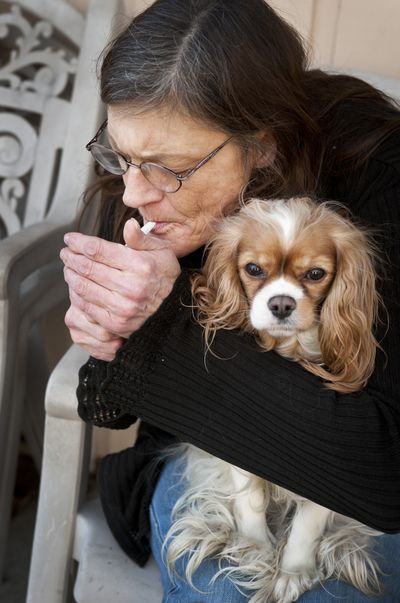Smoking ban at low-income properties has mixed support
Spokane Housing Authority moves to prevent fires, protect health

The Spokane Housing Authority, one of the Spokane area’s biggest landlords to the poor, is banning smoking in individual apartments and common spaces at all its residential properties.
The no-smoking policy will become effective May 1, according to a letter tenants began receiving this week from the housing authority’s director of assets, Lucy Lepinski.
The policy, which includes the smoking of medical marijuana or burning incense and sage, was greeted with mixed reviews by tenants.
“I can see people not wanting to be around people who smoke” in public places, said Barbara Wigen, who lives at the Valley 206 Apartments in Spokane Valley, home to Spokane Housing Authority tenants of mixed income levels.
“But a private residence is sacred space,” Wigen said. “You should be able to do anything that is legal and not have anybody tell you what you can or cannot do.”
Though she is a nonsmoker, she said her adult son and friends smoke when they visit her. Wigen said she was concerned for her smoking neighbors who depend on federally subsidized housing administered by the housing authority and who may have few other choices when it comes to landlords.
However, Kellie Aronson, a Valley 206 resident who smokes, said she has been trying to quit anyway.
“Maybe this will be an incentive,” Aronson said.
Next door, Andrea Johnson said she planned on quitting, too.
“Most of the people who live here are low-income and can’t afford to smoke anyway,” Johnson said.
The Spokane Housing Authority, a public corporation which owns about 760 units in 16 properties in Spokane and Spokane Valley, met with its tenants before arriving at its no-smoking policy, said executive director Steve Cervantes.
“There was a consensus that the majority of tenants wanted to implement this,” Cervantes said.
The change also was recommended by the U.S. Department of Housing and Urban Development, which was responsible for the inclusion of marijuana in the Spokane Housing Authority’s policy, Cervantes said.
Though Washington state law allows the use of marijuana with the permission of a physician, the federal government does not.
Cervantes said the housing authority’s board of directors arrived at its policy primarily because of health risks from secondhand smoke to visitors, other tenants and employees.
No filtration system is able to contain secondhand smoke, said Julie Scholer, of the Spokane Regional Health District.
Cigarette smoking also is the No. 1 cause of death in homes due to fire, she said, and insurance companies are beginning to offer discounts on premiums for nonsmoking properties.
Cervantes said at least one of the five fires at the housing authority’s Hifumi En Apartments in the past few years was the result of smoking. A fire caused by a smoking tenant who uses oxygen damaged several apartments at Valley 206 about two years ago.
In addition, cleaning up apartments vacated by smokers costs landlords hundreds if not thousands of dollars, Scholer said, and many private-sector residential property managers are implementing no-smoking policies as well.
Smoking is prohibited by Moland Management Co., of Spokane, at its more than 1,000 properties, spokeswoman Kim Meredith said.
About 14.8 percent of Washington residents smoke, compared to about 20 percent nationally, Scholer said. But that number increases to about 35 percent among lower-income, lower-educated residents.
The Spokane Housing Authority is allowing a temporary exemption to its policy, which will allow current tenants who smoke to continue until it’s time to renew their leases. The policy allows for four violations, after which tenants could face eviction.
“It’s important to know the majority of adults in Washington state prefer smoke-free environments,” Scholer said.